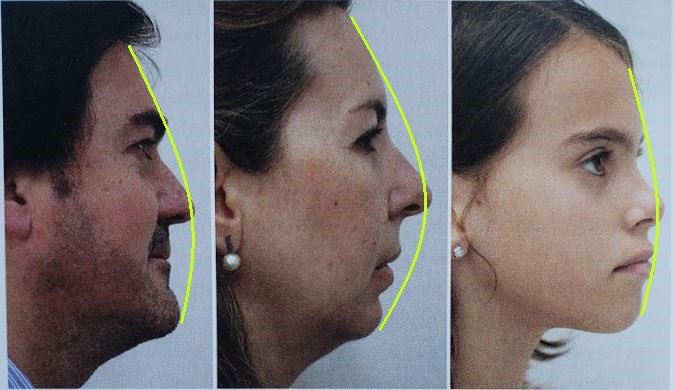A thread on Nasal Breathing - Why it it is necessary for human function & performance
Travis et. al, 1996 found that breathing through the nose during aerobic exercise decreased perception of stress/intensity and significantly https://abs.twimg.com/emoji/v2/... draggable="false" alt="⬆️" title="Pfeil nach oben" aria-label="Emoji: Pfeil nach oben"> endurance...
https://abs.twimg.com/emoji/v2/... draggable="false" alt="⬆️" title="Pfeil nach oben" aria-label="Emoji: Pfeil nach oben"> endurance...
Travis et. al, 1996 found that breathing through the nose during aerobic exercise decreased perception of stress/intensity and significantly
This is because it improves the efficiency of oxygen delivery.
The Bohr Effect describes how https://abs.twimg.com/emoji/v2/... draggable="false" alt="⬆️" title="Pfeil nach oben" aria-label="Emoji: Pfeil nach oben"> Carbon Dioxide (what we breathe out) leads to
https://abs.twimg.com/emoji/v2/... draggable="false" alt="⬆️" title="Pfeil nach oben" aria-label="Emoji: Pfeil nach oben"> Carbon Dioxide (what we breathe out) leads to  https://abs.twimg.com/emoji/v2/... draggable="false" alt="⬆️" title="Pfeil nach oben" aria-label="Emoji: Pfeil nach oben"> oxygen released by storage hemeproteins in our blood to our tissues.
https://abs.twimg.com/emoji/v2/... draggable="false" alt="⬆️" title="Pfeil nach oben" aria-label="Emoji: Pfeil nach oben"> oxygen released by storage hemeproteins in our blood to our tissues.
When CO2 https://abs.twimg.com/emoji/v2/... draggable="false" alt="⬆️" title="Pfeil nach oben" aria-label="Emoji: Pfeil nach oben">, we are triggered to breathe more air in.
https://abs.twimg.com/emoji/v2/... draggable="false" alt="⬆️" title="Pfeil nach oben" aria-label="Emoji: Pfeil nach oben">, we are triggered to breathe more air in.
The Bohr Effect describes how
When CO2
However, if we breathe too much air in (overbreathing) through the mouth, we will exhale too much CO2.
This can cause us to offload too much and then https://abs.twimg.com/emoji/v2/... draggable="false" alt="⬇️" title="Pfeil nach unten" aria-label="Emoji: Pfeil nach unten"> the concentration of CO2, therefore
https://abs.twimg.com/emoji/v2/... draggable="false" alt="⬇️" title="Pfeil nach unten" aria-label="Emoji: Pfeil nach unten"> the concentration of CO2, therefore  https://abs.twimg.com/emoji/v2/... draggable="false" alt="⬇️" title="Pfeil nach unten" aria-label="Emoji: Pfeil nach unten"> the delivery of oxygen to our tissues and muscles.
https://abs.twimg.com/emoji/v2/... draggable="false" alt="⬇️" title="Pfeil nach unten" aria-label="Emoji: Pfeil nach unten"> the delivery of oxygen to our tissues and muscles.
This can cause us to offload too much and then
This then  https://abs.twimg.com/emoji/v2/... draggable="false" alt="⬆️" title="Pfeil nach oben" aria-label="Emoji: Pfeil nach oben"> the rate of the breath and then
https://abs.twimg.com/emoji/v2/... draggable="false" alt="⬆️" title="Pfeil nach oben" aria-label="Emoji: Pfeil nach oben"> the rate of the breath and then  https://abs.twimg.com/emoji/v2/... draggable="false" alt="⬆️" title="Pfeil nach oben" aria-label="Emoji: Pfeil nach oben"> fatigue.
https://abs.twimg.com/emoji/v2/... draggable="false" alt="⬆️" title="Pfeil nach oben" aria-label="Emoji: Pfeil nach oben"> fatigue.
If we nasal breathe, we:
- Clean the air as it enters
- Use our diaphragm more and less risk for compensatory neck breathing
- Produce Nitric Oxide which controls bloodflow and https://abs.twimg.com/emoji/v2/... draggable="false" alt="⬆️" title="Pfeil nach oben" aria-label="Emoji: Pfeil nach oben"> oxygen uptake in cells/working tissues
https://abs.twimg.com/emoji/v2/... draggable="false" alt="⬆️" title="Pfeil nach oben" aria-label="Emoji: Pfeil nach oben"> oxygen uptake in cells/working tissues
If we nasal breathe, we:
- Clean the air as it enters
- Use our diaphragm more and less risk for compensatory neck breathing
- Produce Nitric Oxide which controls bloodflow and
Dallan et. al, 2018 compared endurance runners utilizing nasal only vs mouth only breathing.
They found maximum rate of oxygen consumption was not different, but the ratio of oxygen intake to CO2 output https://abs.twimg.com/emoji/v2/... draggable="false" alt="⬇️" title="Pfeil nach unten" aria-label="Emoji: Pfeil nach unten"> during nasal breathing which was due to
https://abs.twimg.com/emoji/v2/... draggable="false" alt="⬇️" title="Pfeil nach unten" aria-label="Emoji: Pfeil nach unten"> during nasal breathing which was due to  https://abs.twimg.com/emoji/v2/... draggable="false" alt="⬆️" title="Pfeil nach oben" aria-label="Emoji: Pfeil nach oben"> efficiency of oxygen delivery.
https://abs.twimg.com/emoji/v2/... draggable="false" alt="⬆️" title="Pfeil nach oben" aria-label="Emoji: Pfeil nach oben"> efficiency of oxygen delivery.
They found maximum rate of oxygen consumption was not different, but the ratio of oxygen intake to CO2 output
However, at some point during highly intense exercise, we will need to start breathing through our mouth.
Recinto et. al, found that during anaerobic power training (high intensity output on a cycle), it didn’t matter as much. Using a combination of both nasal and mouth
Recinto et. al, found that during anaerobic power training (high intensity output on a cycle), it didn’t matter as much. Using a combination of both nasal and mouth
breathing is probably ideal.
As for outside of exercise, it is still massively important.
The term “mouth breather” has a negative connotation to it for good reason.
In terms of human development, mouth breathing patterns have been shown to https://abs.twimg.com/emoji/v2/... draggable="false" alt="⬇️" title="Pfeil nach unten" aria-label="Emoji: Pfeil nach unten"> facial/cranial development.
https://abs.twimg.com/emoji/v2/... draggable="false" alt="⬇️" title="Pfeil nach unten" aria-label="Emoji: Pfeil nach unten"> facial/cranial development.
As for outside of exercise, it is still massively important.
The term “mouth breather” has a negative connotation to it for good reason.
In terms of human development, mouth breathing patterns have been shown to

 Read on Twitter
Read on Twitter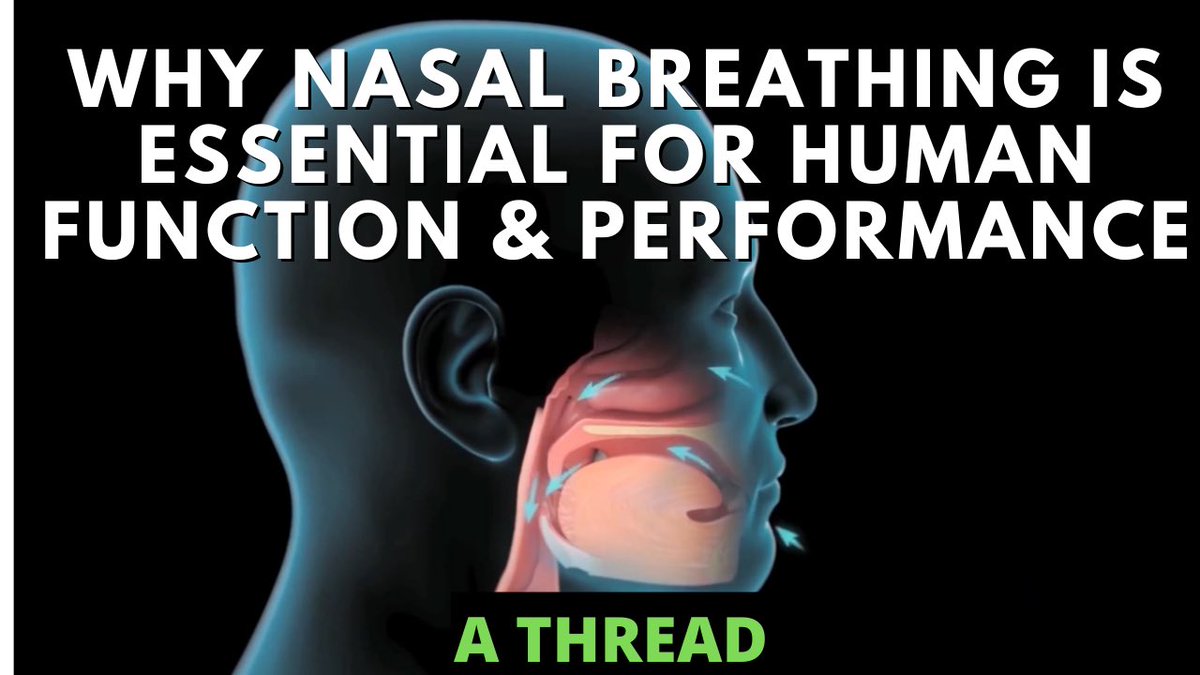 endurance..." title="A thread on Nasal Breathing - Why it it is necessary for human function & performanceTravis et. al, 1996 found that breathing through the nose during aerobic exercise decreased perception of stress/intensity and significantly https://abs.twimg.com/emoji/v2/... draggable="false" alt="⬆️" title="Pfeil nach oben" aria-label="Emoji: Pfeil nach oben"> endurance..." class="img-responsive" style="max-width:100%;"/>
endurance..." title="A thread on Nasal Breathing - Why it it is necessary for human function & performanceTravis et. al, 1996 found that breathing through the nose during aerobic exercise decreased perception of stress/intensity and significantly https://abs.twimg.com/emoji/v2/... draggable="false" alt="⬆️" title="Pfeil nach oben" aria-label="Emoji: Pfeil nach oben"> endurance..." class="img-responsive" style="max-width:100%;"/>
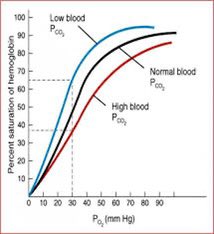 Carbon Dioxide (what we breathe out) leads to https://abs.twimg.com/emoji/v2/... draggable="false" alt="⬆️" title="Pfeil nach oben" aria-label="Emoji: Pfeil nach oben"> oxygen released by storage hemeproteins in our blood to our tissues.When CO2 https://abs.twimg.com/emoji/v2/... draggable="false" alt="⬆️" title="Pfeil nach oben" aria-label="Emoji: Pfeil nach oben">, we are triggered to breathe more air in." title="This is because it improves the efficiency of oxygen delivery.The Bohr Effect describes how https://abs.twimg.com/emoji/v2/... draggable="false" alt="⬆️" title="Pfeil nach oben" aria-label="Emoji: Pfeil nach oben"> Carbon Dioxide (what we breathe out) leads to https://abs.twimg.com/emoji/v2/... draggable="false" alt="⬆️" title="Pfeil nach oben" aria-label="Emoji: Pfeil nach oben"> oxygen released by storage hemeproteins in our blood to our tissues.When CO2 https://abs.twimg.com/emoji/v2/... draggable="false" alt="⬆️" title="Pfeil nach oben" aria-label="Emoji: Pfeil nach oben">, we are triggered to breathe more air in." class="img-responsive" style="max-width:100%;"/>
Carbon Dioxide (what we breathe out) leads to https://abs.twimg.com/emoji/v2/... draggable="false" alt="⬆️" title="Pfeil nach oben" aria-label="Emoji: Pfeil nach oben"> oxygen released by storage hemeproteins in our blood to our tissues.When CO2 https://abs.twimg.com/emoji/v2/... draggable="false" alt="⬆️" title="Pfeil nach oben" aria-label="Emoji: Pfeil nach oben">, we are triggered to breathe more air in." title="This is because it improves the efficiency of oxygen delivery.The Bohr Effect describes how https://abs.twimg.com/emoji/v2/... draggable="false" alt="⬆️" title="Pfeil nach oben" aria-label="Emoji: Pfeil nach oben"> Carbon Dioxide (what we breathe out) leads to https://abs.twimg.com/emoji/v2/... draggable="false" alt="⬆️" title="Pfeil nach oben" aria-label="Emoji: Pfeil nach oben"> oxygen released by storage hemeproteins in our blood to our tissues.When CO2 https://abs.twimg.com/emoji/v2/... draggable="false" alt="⬆️" title="Pfeil nach oben" aria-label="Emoji: Pfeil nach oben">, we are triggered to breathe more air in." class="img-responsive" style="max-width:100%;"/>
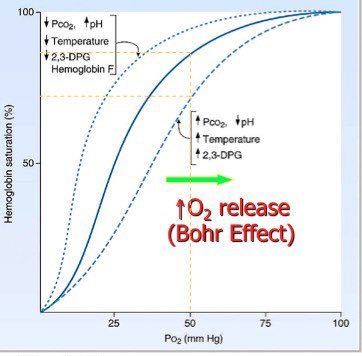 the concentration of CO2, therefore https://abs.twimg.com/emoji/v2/... draggable="false" alt="⬇️" title="Pfeil nach unten" aria-label="Emoji: Pfeil nach unten"> the delivery of oxygen to our tissues and muscles." title="However, if we breathe too much air in (overbreathing) through the mouth, we will exhale too much CO2. This can cause us to offload too much and then https://abs.twimg.com/emoji/v2/... draggable="false" alt="⬇️" title="Pfeil nach unten" aria-label="Emoji: Pfeil nach unten"> the concentration of CO2, therefore https://abs.twimg.com/emoji/v2/... draggable="false" alt="⬇️" title="Pfeil nach unten" aria-label="Emoji: Pfeil nach unten"> the delivery of oxygen to our tissues and muscles." class="img-responsive" style="max-width:100%;"/>
the concentration of CO2, therefore https://abs.twimg.com/emoji/v2/... draggable="false" alt="⬇️" title="Pfeil nach unten" aria-label="Emoji: Pfeil nach unten"> the delivery of oxygen to our tissues and muscles." title="However, if we breathe too much air in (overbreathing) through the mouth, we will exhale too much CO2. This can cause us to offload too much and then https://abs.twimg.com/emoji/v2/... draggable="false" alt="⬇️" title="Pfeil nach unten" aria-label="Emoji: Pfeil nach unten"> the concentration of CO2, therefore https://abs.twimg.com/emoji/v2/... draggable="false" alt="⬇️" title="Pfeil nach unten" aria-label="Emoji: Pfeil nach unten"> the delivery of oxygen to our tissues and muscles." class="img-responsive" style="max-width:100%;"/>
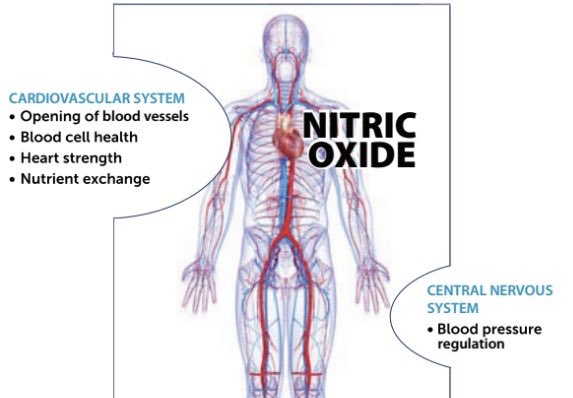 the rate of the breath and then https://abs.twimg.com/emoji/v2/... draggable="false" alt="⬆️" title="Pfeil nach oben" aria-label="Emoji: Pfeil nach oben"> fatigue.If we nasal breathe, we:- Clean the air as it enters- Use our diaphragm more and less risk for compensatory neck breathing- Produce Nitric Oxide which controls bloodflow and https://abs.twimg.com/emoji/v2/... draggable="false" alt="⬆️" title="Pfeil nach oben" aria-label="Emoji: Pfeil nach oben"> oxygen uptake in cells/working tissues" title="This then https://abs.twimg.com/emoji/v2/... draggable="false" alt="⬆️" title="Pfeil nach oben" aria-label="Emoji: Pfeil nach oben"> the rate of the breath and then https://abs.twimg.com/emoji/v2/... draggable="false" alt="⬆️" title="Pfeil nach oben" aria-label="Emoji: Pfeil nach oben"> fatigue.If we nasal breathe, we:- Clean the air as it enters- Use our diaphragm more and less risk for compensatory neck breathing- Produce Nitric Oxide which controls bloodflow and https://abs.twimg.com/emoji/v2/... draggable="false" alt="⬆️" title="Pfeil nach oben" aria-label="Emoji: Pfeil nach oben"> oxygen uptake in cells/working tissues" class="img-responsive" style="max-width:100%;"/>
the rate of the breath and then https://abs.twimg.com/emoji/v2/... draggable="false" alt="⬆️" title="Pfeil nach oben" aria-label="Emoji: Pfeil nach oben"> fatigue.If we nasal breathe, we:- Clean the air as it enters- Use our diaphragm more and less risk for compensatory neck breathing- Produce Nitric Oxide which controls bloodflow and https://abs.twimg.com/emoji/v2/... draggable="false" alt="⬆️" title="Pfeil nach oben" aria-label="Emoji: Pfeil nach oben"> oxygen uptake in cells/working tissues" title="This then https://abs.twimg.com/emoji/v2/... draggable="false" alt="⬆️" title="Pfeil nach oben" aria-label="Emoji: Pfeil nach oben"> the rate of the breath and then https://abs.twimg.com/emoji/v2/... draggable="false" alt="⬆️" title="Pfeil nach oben" aria-label="Emoji: Pfeil nach oben"> fatigue.If we nasal breathe, we:- Clean the air as it enters- Use our diaphragm more and less risk for compensatory neck breathing- Produce Nitric Oxide which controls bloodflow and https://abs.twimg.com/emoji/v2/... draggable="false" alt="⬆️" title="Pfeil nach oben" aria-label="Emoji: Pfeil nach oben"> oxygen uptake in cells/working tissues" class="img-responsive" style="max-width:100%;"/>
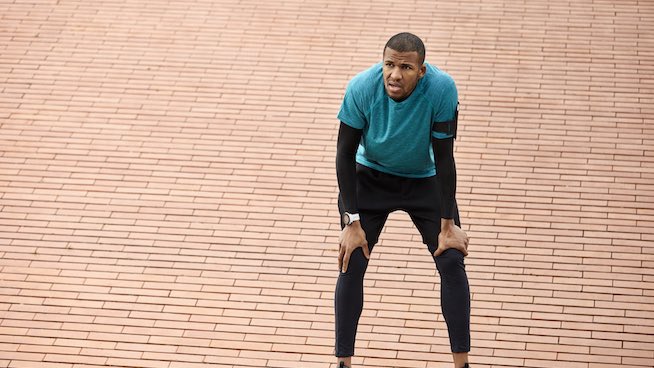
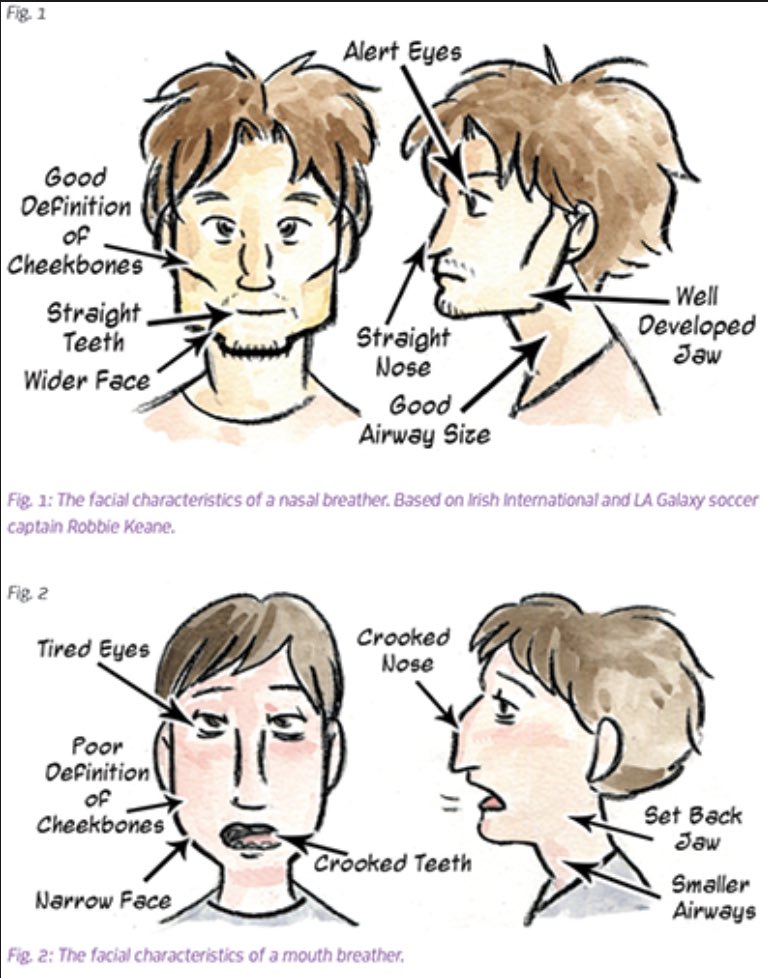 facial/cranial development." title="breathing is probably ideal.As for outside of exercise, it is still massively important.The term “mouth breather” has a negative connotation to it for good reason.In terms of human development, mouth breathing patterns have been shown to https://abs.twimg.com/emoji/v2/... draggable="false" alt="⬇️" title="Pfeil nach unten" aria-label="Emoji: Pfeil nach unten"> facial/cranial development." class="img-responsive" style="max-width:100%;"/>
facial/cranial development." title="breathing is probably ideal.As for outside of exercise, it is still massively important.The term “mouth breather” has a negative connotation to it for good reason.In terms of human development, mouth breathing patterns have been shown to https://abs.twimg.com/emoji/v2/... draggable="false" alt="⬇️" title="Pfeil nach unten" aria-label="Emoji: Pfeil nach unten"> facial/cranial development." class="img-responsive" style="max-width:100%;"/>
